Related Research Articles

An airline is a company that provides air transport services for traveling passengers and freight. Airlines utilize aircraft to supply these services and may form partnerships or alliances with other airlines for codeshare agreements, in which they both offer and operate the same flight. Generally, airline companies are recognized with an air operating certificate or license issued by a governmental aviation body. Airlines may be scheduled or charter operators.
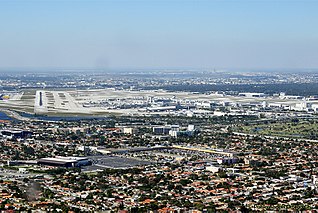
Miami International Airport, also known as MIA and historically as Wilcox Field, is the primary airport serving the Miami area, Florida, United States, with over 1,000 daily flights to 167 domestic and international destinations, and one of three airports serving this area. The airport is in an unincorporated area in Miami-Dade County, 8 miles (13 km) northwest of Downtown Miami, in metropolitan Miami, adjacent to the cities of Miami and Miami Springs, and the village of Virginia Gardens. Nearby are the cities of Hialeah and Doral, and the Census-designated place of Fontainebleau.
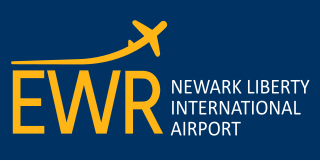
Newark Liberty International Airport, originally Newark Metropolitan Airport and later Newark International Airport, is an international airport straddling the boundary between the cities of Newark and Elizabeth in Essex County and Union County, New Jersey. It is one of the major airports of the New York metropolitan area. The airport is currently owned jointly by the cities of Elizabeth and Newark and leased to and operated by the Port Authority of New York and New Jersey.
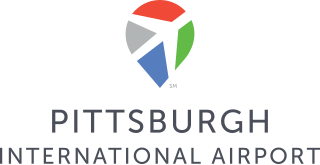
Pittsburgh International Airport, formerly Greater Pittsburgh International Airport, is a civil–military international airport in Moon Township, Pennsylvania. It is the primary international airport serving the Greater Pittsburgh Region, located about 10 miles (15 km) west of downtown Pittsburgh, at an elevation of 1,202 feet (366 m) above sea level.
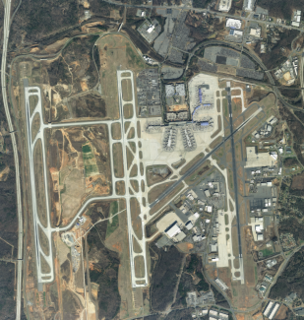
Charlotte Douglas International Airport is an international airport in Charlotte, North Carolina and is the primary airport for commercial and military use in the Charlotte metropolitan area located roughly six miles from the city's central business district. The airport is owned by the City of Charlotte and operated by the city's aviation department. Established in 1935 as Charlotte Municipal Airport, the airport was renamed in 1954 for Ben Elbert Douglas Sr., who was mayor of Charlotte when the airport was first built. It took its present name in 1982. The airport is the 2nd largest hub for American Airlines, serving 148 destinations and operates over 700 daily flights out of Charlotte. CLT covers 5,558 acres of land.

Detroit Metropolitan Wayne County Airport, usually called Detroit Metro Airport, Metro Airport, or just DTW, is a major international airport in the United States covering 4,850 acres (1,960 ha) in Romulus, Michigan. It is the primary international airport serving Detroit and is Michigan's busiest airport. The Federal Aviation Administration (FAA) National Plan of Integrated Airport Systems for 2017–2021 categorized it as a large hub primary commercial service facility.

A low-cost carrier or low-cost airline is an airline that is operated with an especially high emphasis on minimizing operating costs and without some of the traditional services and amenities provided in the fare, resulting in lower fares and fewer comforts. To make up for revenue lost in decreased ticket prices, the airline may charge extra fees – such as for carry-on baggage. As of April 2020, the world's largest low-cost carrier is Southwest Airlines, which operates primarily in the United States, as well as in some surrounding areas.
Computer reservation systems, or central reservation systems (CRS), are computerized systems used to store and retrieve information and conduct transactions related to air travel, hotels, car rental, or other activities. Originally designed and operated by airlines, CRSs were later extended for use by travel agencies. global distribution systems (GDS) to book and sell tickets for multiple airlines. Most airlines have outsourced their CRSs to GDS companies, which also enable consumer access through Internet gateways. Modern GDSs typically also allow users to book hotel rooms, rental cars, airline tickets as well as other activities and tours. They also provide access to railway reservations and bus reservations in some markets, although these are not always integrated with the main system. These are also used to relay computerized information for users in the hotel industry, making reservation and ensuring that the hotel is not overbooked.
Sabre Global Distribution System, owned by Sabre Corporation, is used by travel agents and companies around the world to search, price, book, and ticket travel services provided by airlines, hotels, car rental companies, rail providers and tour operators. Sabre aggregates airlines, hotels, online and offline travel agents and travel buyers.
A Passenger Name Record (PNR) is a record in the database of a computer reservation system (CRS) that contains the itinerary for a passenger, or a group of passengers travelling together. The concept of a PNR was first introduced by airlines that needed to exchange reservation information in case passengers required flights of multiple airlines to reach their destination (“interlining”). For this purpose, IATA and ATA have defined standards for interline messaging of PNR and other data through the "ATA/IATA Reservations Interline Message Procedures - Passenger" (AIRIMP). There is no general industry standard for the layout and content of a PNR. In practice, each CRS or hosting system has its own proprietary standards, although common industry needs, including the need to map PNR data easily to AIRIMP messages, has resulted in many general similarities in data content and format between all of the major systems.
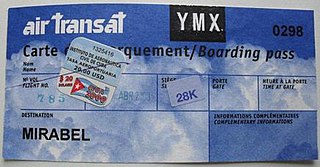
A boarding pass or boarding card is a document provided by an airline during check-in, giving a passenger permission to enter the restricted area of an airport and to board the airplane for a particular flight. At a minimum, it identifies the passenger, the flight number, and the date and scheduled time for departure. A boarding pass may also indicate details of the perks a passenger is entitled to and is thus presented at the entrance of such facilities to show eligibility.

An electronic ticket, often called e-ticket, is the digital ticket equivalent of a paper ticket. The term is most commonly associated with airline issued tickets. Electronic ticketing for urban or rail public transport is usually referred to as travel card or transit pass. It is also used in ticketing in the entertainment industry.
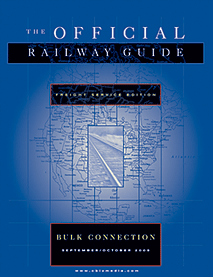
The Official Guide of the Railways, now known as the Official Railway Guide, was originally produced by National Railway Publication Company of New York City, beginning in 1868. The modern Official Railway Guide provides routing and shipping information for freight on United States railroads and is now published by the RailResource division of JOC.
Airline booking ploys are used by travelers in commercial aviation to lower the price of flying by circumventing airlines' rules about how tickets may be used. They are generally a breach of the contract of carriage between the passenger and the airline, which airlines may try to enforce in various ways.
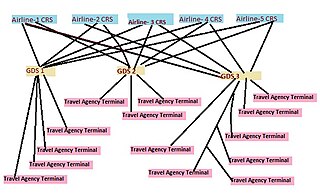
A global distribution system (GDS) is a computerised network system owned or operated by a company that enables transactions between travel industry service providers, mainly airlines, hotels, car rental companies, and travel agencies. The GDS mainly uses real-time inventory to service providers. Travel agencies traditionally relied on GDS for services, products and rates in order to provide travel-related services to the end consumers. Thus, a GDS can link services, rates and bookings consolidating products and services across all three travel sectors: i.e., airline reservations, hotel reservations, car rentals.
On most modern airlines, flying standby occurs when a passenger travels on a flight without a prior reservation for that specific flight. There are four circumstances in which passengers typically fly standby. First, a missed flight may require a passenger to fly standby on the next flight to the same destination, as they now lack a reservation. Secondly, a passenger may arrive at the airport early and wish to take an earlier flight listed for that day. They will then attempt to travel standby on the earlier flight, and failing that, proceed to take their booked flight. This is referred to in the industry as "go-show".

Airport check-in is the process whereby passengers are accepted by an airline at the airport prior to travel. The airlines typically use service counters found at airports. The check-in is normally handled by an airline itself or a handling agent working on behalf of an airline. Passengers usually hand over any baggage that they do not wish or are not allowed to carry in to the aircraft's cabin and receive a boarding pass before they can proceed to board their aircraft.
Interlining, also known as interline ticketing and interline booking, is a voluntary commercial agreement between individual airlines to handle passengers traveling on itineraries that require multiple flights on multiple airlines. Such agreements allow passengers to change from one flight on one airline to another flight on another airline without having to gather their bags or check-in again. Airlines can also promise free rebooking if the connection is lost due to a delay.

An airline ticket is a document or electronic record, issued by an airline or a travel agency, that confirms that an individual is entitled to a seat on a flight on an aircraft. The airline ticket may be one of two types: a paper ticket, which comprises coupons or vouchers; and an electronic ticket.
Airline reservation systems (ARS) are part of the so-called passenger service systems (PSS), which are applications supporting the direct contact with the passenger.
References
- ↑ A Dictionary of Travel and Tourism Terminology, 2nd edition By Allan Beaver
- ↑ "Airlines turn to XML to try to fix e-ticket transfer problems". 27 September 2000. Archived from the original on 10 February 2007.